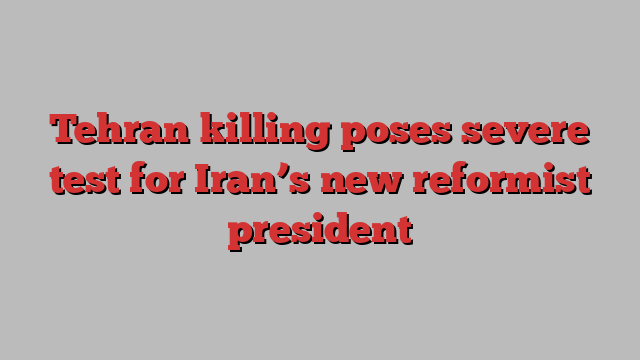
Just hours after Masoud Pezeshkian was sworn in as Iran’s new president and warmly greeted visiting Hamas leader Ismail Haniyeh, the Palestinian guest was killed in a targeted attack allegedly orchestrated by Israel.
The assassination on home soil has posed an early and severe test for the new president elected this month with a promise to manage tensions with the west and win relief from swingeing US sanctions. More significantly, it has exposed big vulnerabilities in Iran’s security and intelligence apparatus and shaken the theocratic system that has governed the country since the 1979 revolution.
“This is not only a massive blow to Pezeshkian, but a far bigger blow to the Islamic Republic, which is now literally being challenged by Israel to go to war,” said Saeed Laylaz, a reformist analyst. “Israel’s main message to Iran is: ‘We could kill any of Iran’s leaders too’.”
As he grappled with his first major foreign policy crisis, Pezeshkian fell in line with supreme leader Ayatollah Ali Khamenei and others, declaring that the assassination of Hamas’s top political leader necessitated a response from Iran.
Pezeshkian, a 69-year-old former health minister, adheres to the Islamic regime’s core policy of opposing Israel and supporting anti-Israel militias across the region, including Haniyeh’s Hamas. In his new role he has also sought room for manoeuvre in foreign policy, such as reviving nuclear talks with the US and expanding ties with European countries. However, there are limitations on his powers, with all key foreign policy decisions determined by Khamenei and the powerful Revolutionary Guard.
Ali Rabiei, a Pezeshkian adviser, called Haniyeh’s killing “a vicious shot” at the Iranian people’s choice of a reformist president.
While Iran and Israel have engaged in a shadow war for decades, the tumult unleashed by Hamas’s October 7 assault on Israel has placed the two adversaries increasingly at risk of a direct confrontation.
Iran has long provided crucial financial and military support to its regional proxies, which also includes Hizbollah in Lebanon, the Houthis in Yemen and Iraqi Shia militias. It generally avoids direct confrontations with Israel.
Yet the attack on Haniyeh, who earlier on Tuesday met Khamenei, is a significant blow to the regime’s credibility. The regime will now be under huge pressure not to overlook the embarrassment of having a foreign guest killed during a state visit — including from the same militant groups who look to Tehran for leadership.
The last significant stand-off between Iran and Israel occurred in April when Israel attacked Iran’s consulate in Syria, killing military commanders.
Iran responded by launching hundreds of missiles and drones into Israeli airspace from its own soil — the first direct assault on Israel by Iran. But crucially, the regime ensured that the US, Israel’s ally, was informed in advance, signalling a desire to avoid escalation into a full-scale war while fulfilling the promise of retaliation. Most of the missiles and drones fired at Israel were intercepted.
The assassination of Haniyeh at 2am local time in affluent northern Tehran, where he was staying in a residential building dedicated to Iran’s war veterans, raises questions about the potential for further direct encounters.
Local media speculated that the attack was an aerial assault, although they did not specify whether drones or other advanced systems were used. Israeli operations inside Iran in recent years have often employed sophisticated technology, and this incident appears consistent with that pattern.
Iranian analysts argue that the killing of Haniyeh — a frequent visitor to Iran who often met top leaders — surpasses previous Israeli alleged actions, such as the assassinations of at least five Iranian nuclear scientists on Iranian soil over the past decade.
Laylaz questioned how such a co-ordinated attack could occur in Tehran under tight security: “How did Haniyeh’s killing happen in the heart of Tehran with this level of co-ordination under the security lens of Iran for a foreign dignitary?”
He added: “The question now is not whether Iran can negotiate with the west. It’s how the security apparatus has become so corrupt, sending all details to Israel.”
The assassination occurred shortly after Israel announced an air strike targeting Fuad Shukr, a leading Hizbollah commander in Beirut. Israel claimed to have killed Shukr, right-hand man to the group’s leader Hassan Nasrallah.
The Islamic Republic is now concerned about the extent of Israel’s intentions, according to analysts. Hossein Alaei, a former commander of the Revolutionary Guard, said on the Jamaran news website that the assassinations indicated Israeli plans to target all leaders of anti-Israel militias. He warned that it also sent a message that Israel would not allow it to reform or to improve relations with the outside world, and that the Jewish state aimed to scupper Pezeshkian’s chances of improving relations with the west.
The killings could also strengthen the hand of hardliners in Iran, still reeling from the unexpected loss of the presidency. They are likely to push for an escalation against Israel, and could potentially seek to sideline Pezeshkian’s government in foreign policy before it has even begun.
Hamid Rasaei, a hardline cleric and opponent of the new president, proclaimed on X that Iran was now “in a direct confrontation” with its old adversary. The only viable response, he said, was to “uproot Israel”.